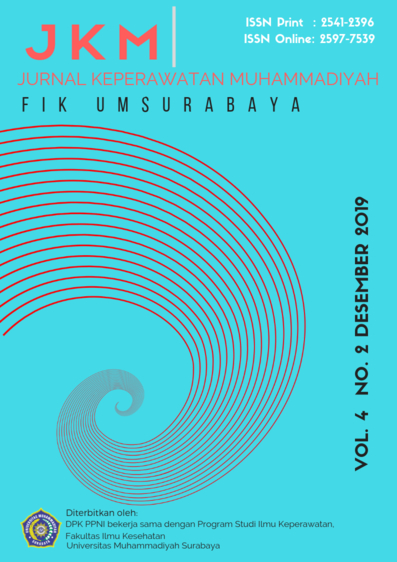Comparison of Child Development Between Aterm and Premature Birth at Age 2-3 Years Old
DOI:
https://doi.org/10.30651/jkm.v4i2.1976Keywords:
children development, development disorder, premature birthAbstract
Objective: Premature births are at risk of developing language delays, motor balance and coordination. This study aims to analyze developmental differences in children with a history of premature birth and term.Â
Methods: The data used was primary data through filling questionnaires and interviews to subjects. This study was observational analytic with retrospective cohort design. The population was all 2-3 years old children at Kabupaten Probolinggo. Sampling was using a simple sampling formula and obtained 100 children into 2 groups. First group was 50 children who aterm at birth. Second group was 50 children who premature at birth.Â
Â
Result: The result showed that there were there is significant different at child development between aterm and premature born childen (p<0.05). The relative risk (RR) analysis showed that the value is significant enough. Children development was influenced by type of born (RR=1.647x)
Â
Conclusion: The development of 2-3 years old children is very important, especially children with a history of premature birth who have a risk of developmental disorders. Parents should give more attention in providing appropriate developmental stimulation according to the child's age.References
Blencowe, H., Cousens, S., Oestergaard, M., Chou, D., Moller, A.B., . . . Lawn, J.E. (2012). National, regional and worldwide estimates of preterm birth. The Lancet. 9; 379(9832):2162-72.
Campbell, S.K. (1999). The infant at risk for developmental disability. In: Campbell, S.K. Decision making in pediatric physical therapy. New-York: Churchill Livingstone 260-332.
Cheong, J.L.Y., Hunt, R.W., Anderson, P.J., Howard, K., Thompson, D.K., Wang, H.X. . . . Doyle L.W. (2008). Head growth in preterm infants: Correlation with magnetic resonance imaging and neurodevelopmental outcome. Pediatrics; 121:E1534–40.
Dinas Kesehatan Kabupaten Probolinggo. (2015). Profil Kesehatan Kabupaten Probolinggo Tahun 2015. Retrieved from http://dinkes.probolinggokab.go.id/dokumen /profilkesehatan/PROFIL_KESEHATAN_KAB_PROBOLINGGO_2015.pdf
Formiga, C.K.M.R. & Linhares, M.B.M. (2009). Assessment of preterm children’s early development. Rev Esc Enferm USP; 43(2):469-76
Hagberg, H. & Jacobsson, B.. (2005). Brain injury in preterm infants: what can the obstetrician do? Early Hum Dev;81(3):231-5.
Kementrian Kesehatan. (2016). Pedoman Pelaksanaan Stimulasi, Deteksi, dan Intervensi Dini Tumbuh Kembang Anak ditingkat Pelayanan Kesehatan Dasar (pp. 51-52). Jakarta : Departemen Kesehatan RI.
Lemos, R.A., Frônio, J.S., Ribeiro, L.C., Demarchi, R.S., Silva, J., Neves, L.A.T. (2012) Functional performance according to gestational age and Birth weight of preschool children born premature or with low weight. J Hum Growth Dev.;22(1):17-26.
O’Shea, T.M., Counsell, S.J., Bartels, D.B., & Dammann, O. (2005). Magnetic resonance and ultrasound brain imaging on preterm infants. Early Hum Dev. ;81(2):263-71.
Pilz, E.M.L. & Schermann, L.B. (2007). Determinantes biológicos e ambientais no desenvolvimento neuropsicomotor em uma amostra de crianças de Canoas/RS. Cienc Saude Colet.;12(1):181-90.
van Noort-van der Spek, I.L., Franken, M.C., & Weisglas-Kuperus, N. (2012). Language Functions in Preterm-Born Children : A Systematic Review and Meta-analysis. Pediatrics;129:E4751-2.
van Noort-van der Spek, I.L., Franken, M.C., Wieringa, M.H. & Weisglas-Kuperus, N. (2010). Phono-logical development in very-low-birthweight children: an exploratory study. Dev Med Child Neuro;52(6):541–546.
WHO. (2018, February 19). Preterm birth. Retrieved June 4, 2018, from http://www.who.int/news-room/fact-sheets/detail/preterm-birth
Wright, C.M. & Emond, A.. (2015). Head growth and neurocognitive outcomes. Pediatrics 135:E1393–8.
Downloads
Published
Issue
Section
License
- Penulis tetap memegang hak atas karyanya dan memberikan hak publikasi pertama kepada jurnal ini yang secara simultan karya tersebut dilisensikan di bawah:Â Creative Commons Attribution-ShareAlike 4.0 International (CC BY-SA 4.0)













